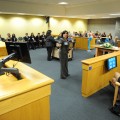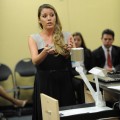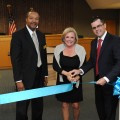NSU Newsroom
SharkBytes
Horizons
This version of NSU News has been archived as of February 28, 2019. To search through archived articles, visit nova.edu/search. To access the new version of NSU News, visit news.nova.edu.
This version of SharkBytes has been archived as of February 28, 2019. To search through archived articles, visit nova.edu/search. To access the new version of SharkBytes, visit sharkbytes.nova.edu.
NSU Law Center Announces Technology Upgrade to Student Courtrooms
NSU’s Shepard Broad Law Center held a ribbon-cutting ceremony in December 2012, showcasing technological upgrades to the Law Center’s courtrooms, jury room and judge’s chambers. The technology upgrades will allow students to practice in an environment similar to courtrooms being utilized today. Additionally, faculty can use the technology to enhance the teaching of complex materials, demonstrate drafting techniques, and bring current information directly to the classroom.
The upgrades include the ability to operate the courtroom in one of three modes: classroom, courtroom with a judge (enabling the judge to approve what is visible to the jury and spectators), and courtroom without a judge (for use with CLE and other presentations). Two cameras in the front and back of the courtroom enable students and educators to record presentations for replay and evaluation. The center touch-screen control panel allows for easy control of all of the technology in the courtroom. Presenters can easily connect laptops and other technology for presentations and information exchange.
“The technology in the rooms will enable our students to continue developing the skills important for advocacy at the trial and appellate court level,” said Athornia Steele, dean of the Shepard Broad Law Center. “Technology is not a replacement for the fundamental skills at the heart of becoming an effective advocate, but is a tool that augments and elevates advocacy in a world where technology has taken center stage.”
During the ceremony, the Honorable Alan S. Gold, J.D., Judge of the United States United States District Court for the Southern District of Florida, spoke about technology in the courtroom and how it aides in the administration of justice, providing a greater opportunity for the judge and jury to better understand cases before them. Marlene Rodriguez, Assistant U.S. Attorney for the Southern District of Florida, gave an impressive closing argument demonstrating the usefulness of technology in cases. Brooke Latta, a third-year student, noted her class has been encouraged by their teachers to learn and use the technology. She demonstrated the use of the document camera in examining a witness. It is not just the technology, but what technology can do to enhance learning and skills training.
The technology upgrades were made possible through a generous donation from the Salah Foundation, a private foundation that supports non-profit organizations in the United States. The foundation supports education, medical research, community development and self-sufficiency programs aimed at the economically disadvantaged, the young, the elderly and the disabled.


